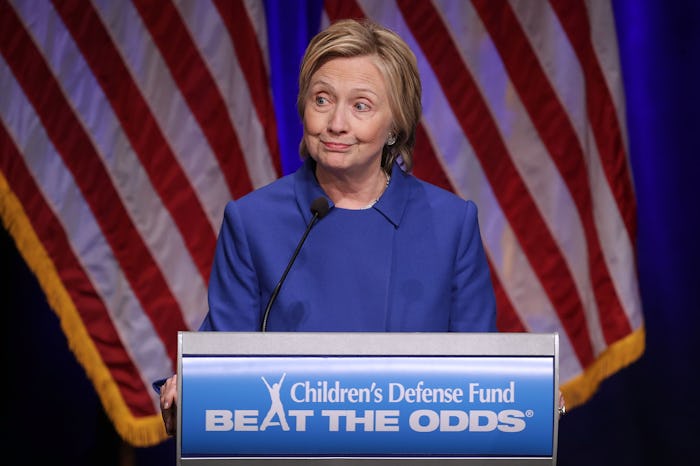News

Hillary Clinton’s Popular Vote Lead Is The Biggest In 140 Years
In the wee hours of the morning on Nov. 9, Donald Trump appeared before supporters to declare victory in the 2016 presidential election. More than three weeks later, ballots are still being tallied, and the latest figures from The Associated Press indicate that Hillary Clinton's popular vote lead is the biggest in 140 years. According to those numbers, Clinton received 64,874,143 votes, while Trump collected 62,516,883 — a difference of 2,357,260.
In simpler terms, Clinton earned 48.1 percent of the vote to Trump's 46.4 percent. And yet, Trump's lead in the Electoral College stands at 306, compared to Clinton's 232 — marking the second time in five elections in which the winner of the popular vote lost the Electoral College and drawing increased attention to a last-ditch effort to prevent Trump from assuming the presidency in January.
The anti-Trump movement is now focused on Dec. 19, when the 538 members of the Electoral College will gather to cast the official votes for their state. It's usually a symbolic process, as electors generally vote according to the results of the popular vote. But this year, a group known as the Hamilton Electors is attempting to turn the Electoral College into more than just a rubber stamp.
The group is named after founding father and first U.S. Treasury Secretary Alexander Hamilton, who wrote in The Federalist Papers about why a young United States needed the Electoral College:
The process of election affords a moral certainty, that the office of President will never fall to the lot of any man who is not in an eminent degree endowed with the requisite qualifications. Talents for low intrigue, and the little arts of popularity, may alone suffice to elevate a man to the first honors in a single State; but it will require other talents, and a different kind of merit, to establish him in the esteem and confidence of the whole Union, or of so considerable a portion of it as would be necessary to make him a successful candidate for the distinguished office of President of the United States.
According to Politico, the Democrat-led group is trying to persuade 37 Republican electors to vote for a candidate other than Trump, which would leave him short of the 270 votes necessary to become president. In addition, leaders of the effort are planning to challenge laws in the 29 states that force electors to vote for the candidate who wins the popular vote in their particular state — and are putting together a coalition of lawyers willing to defend any member of the Electoral College who decides to become what's called a "faithless elector," according to The Atlantic.
Though Clinton's growing lead in the popular vote won't alone change the outcome of the Electoral College, the efforts of the Hamilton Electors could attract more support for the idea of abolishing the Electoral College altogether in favor of a national popular vote. Laurence Tribe, a constitutional law professor at Harvard University, told Politico that:
There might well be a clamor to get rid of the Electoral College altogether, a move that would have some disadvantages (like eliminating Hamilton’s safeguard) but many advantages as well. Anyhow, clamor and anger have become par for the course in this loony election year.
According to a 2013 Gallup poll, 63 percent of Americans said they would vote to do away with the Electoral College if they could. Given Clinton's victory in the popular vote and using the stark policy differences between her and Trump as an example, saying goodbye to the Electoral College could very well change our nation's future. Who knows what the last 16 years would have looked like had Al Gore emerged victorious from the 2000 presidential election, in which Gore won the popular vote (by more than 543,000 votes) but lost the Electoral College to George W. Bush.